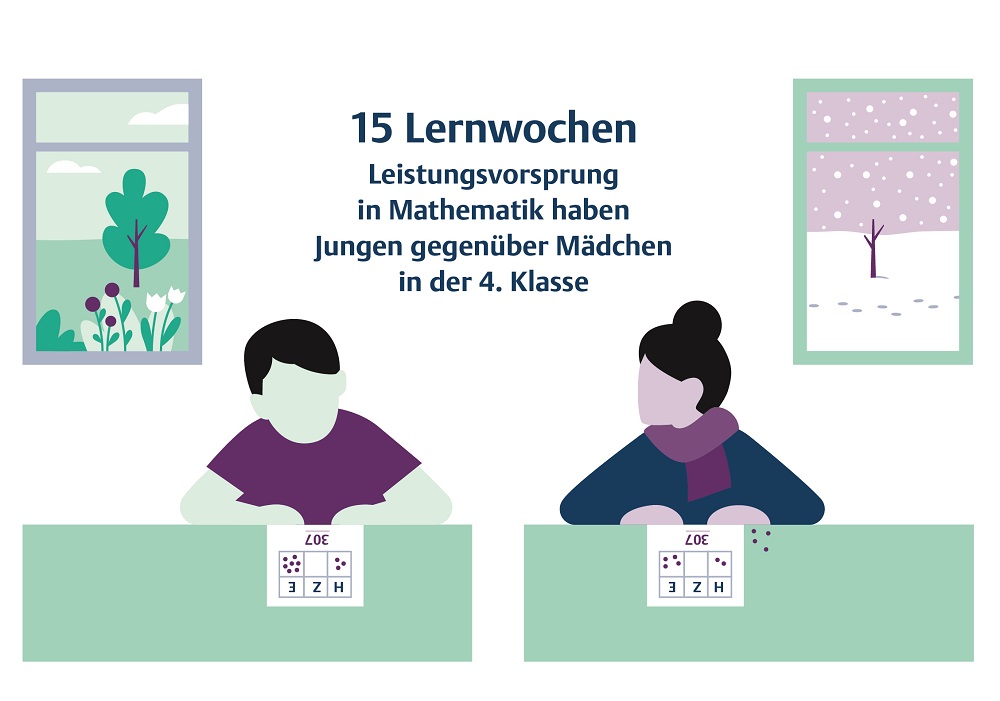STEM education: girls are falling further behind

Munich, 08 May 2023
Education in STEM subjects – Science, Technology, Engineering and Maths – remains a cause for concern. The 2023 STEM Proficiency Study, published by acatech – National Academy of Science and Engineering and the Joachim Herz Foundation, shows considerably lower achievements for girls and recent child migrants. Motivation can be drawn from the finding that universities and their STEM study programmes are very popular with foreign students.
According to the 2023 STEM Proficiency Study, the gender gap in mathematics achievement has widened considerably in the past ten years: ten-year-old boys are around 15 school weeks ahead of girls in terms of achievements. In addition, women are still vastly under-represented in STEM occupations requiring apprenticeships or other formal training as well as in programmes in STEM subjects that combine study and work experience. That said, the percentage of female graduates of traditional STEM courses rose slightly to 31 per cent.
“We shouldn’t tolerate a situation where many girls are opting out of STEM education at an early stage, if for no other reason than the skills shortage that exists. The STEM sector is seen by many, often unconsciously and unintentionally, as more of a male domain. Many girls have this perspective, which is why schoolgirls often feel less drawn to STEM subjects than other subjects. This feeling also carries through to their elective choice in the senior classes and, subsequently, to their choice of field of study or apprenticeship. Efforts should be made to overcome these powerful gender stereotypes. Many more positive female role models are needed. The achievement gap between boys and girls at the end of primary school is very hard to close. To prevent this gap from opening up, early education and primary school teachers and learning support staff should gear teaching more towards girls’ interests and make them aware of the relevance of STEM subjects to society,” said Olaf Köller, Director of the Leibniz Institute for Science and Mathematics Education (IPN) and study lead on the STEM Proficiency Study.
Achievements of recent migrant children lag far behind – Germany a popular location to study
Forced migration in 2015 and 2022 meant that the numbers of schoolchildren in Germany with a migrant background has increased greatly. Their successful integration into the education system is important. However, the 2023 STEM Proficiency Study shows that this has not been achieved: compared with children who do not come from a migrant background, recent immigrants are around one and a half years behind in mathematics at the end of fourth class (ten years of age).
In the coming years many employees will leave the German labour market due to demographic change. Immigration makes it possible to fill the gaps – which makes steering first-generation children and young people in the immigrant population towards STEM subjects all the more important. On a positive note, STEM courses at German universities are very popular with foreign students: the number of foreign STEM students enrolling has risen by around ten per cent compared with the previous year according to the 2023 STEM Proficiency Study.
“Germany is still known for its engineering prowess and this reputation attracts students to the country. The fact that so many people from all over the world come here to study STEM subjects should motivate us to further develop STEM education. Ultimately, this is what lays the groundwork for Germany as an innovation hub. STEM knowledge goes into the development of ideas and technologies in Germany to tackle the major challenges of our time – climate change, energy supply, scarcity of resources,” said acatech President Jan Wörner.
Shortage of teaching staff: falling numbers in STEM teacher training courses is alarming
Having the teaching staff is essential to improving STEM education in Germany. However, the shortage of teaching staff is set to worsen: in 2021 the nationwide intake into STEM teacher training courses was twelve per cent lower than in 2020; in fact, in the computer sciences 23 per cent fewer students enrolled. According to analyses conducted as part of the STEM Proficiency Study, there is a shortfall of between 40,000 and 100,000 teachers.
Plus, fresh impetus is needed in the training of STEM teachers as well, as Sabine Kunst, Chairwoman of the Board of the Joachim Herz Foundation, pointed out. “Trainee and qualified teachers of STEM subjects must be trained and receive continuing training to enable them to teach their subject matter in a way that is up-to-date and exciting and also makes use of innovative digital teaching and learning concepts, thereby instilling an abiding interest in STEM subjects among young people. The recent developments surrounding the use of artificial intelligence creates an added sense of urgency.”
About the STEM Proficiency Study
The STEM Proficiency Study is a nationwide trend report. It compiles and comments on the key data, facts and figures on the situation regarding young talents in the STEM sector, covering all stages from school education to vocational training and university education. The report monitors key indicators to deliver empirical findings on current developments and areas where action is needed in STEM education. It also highlights factors and reasons that influence young adults’ study choice and career path.
The STEM Proficiency Study is jointly published by acatech – National Academy of Science and Engineering and the Joachim Herz Foundation, and is written by the IPN – Leibniz Institute for Science and Mathematics Education. The compact overview provides a well-founded tool to assist decision-makers in education, politics and industry and thus helps to enhance the STEM situation in Germany in the long term.





